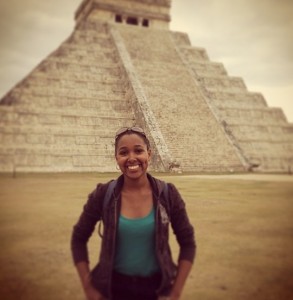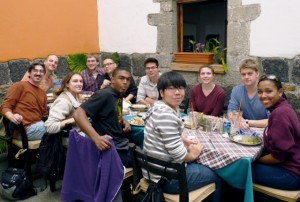After studying in Costa Rica during the fall semester, Jiselle Peralta ’13 (Rego Park, N.Y.) was excited to continue expanding her knowledge of Latin American countries. During the January interim session, she joined nine other students on the intensive short-term study abroad course Mexico Through the Centuries.

Jiselle Peralta ’13 at Chichen Itzá
“That’s the beauty of a liberal arts college—the ability to take classes outside your field of study,” says Peralta, a double major in psychology and women’s and gender studies. “With the amount of traveling and exploring we did, I felt as if Mexico was my classroom and each day was a new lesson in a different town.”
Led by Juan Rojo, assistant professor of foreign languages and literatures (Spanish), and Luis Schettino, assistant professor of psychology, the students spent three weeks examining how Mexican identity evolved and was influenced by the many native cultures, Spanish colonization, French and American interventions, and the social turmoil of the 20th century. The professors provided each student with a reader consisting of material about Mexican culture, food, art, music, and history. But, explains Rojo, each student could design the rest of the course according to his or her own interests. Consequently, students’ projects focused on several aspects of Mexico ranging from the Federal Highway System to the history of lucha libre, Mexican professional wrestling.
Learning about Mexican history and culture in the country itself made the experience all the more powerful.
“It is one thing to read about the origins of the Mexican Revolution and quite another to see where it actually happened,” says Rojo. “The reality of that space, for example, is that the revolution began in a house. I hope that experience humanizes and contextualizes both the grandeur and humble beginnings of such an event. I wanted the students to learn as much, if not more, from the experience of being in a foreign country than from the readings we provided.”

The class enjoys a meal at the Casa de Tlaxcala.
For Edgar Gonzalez ’14 (Jamaica, N.Y.), an international affairs and Spanish double major, experiencing historical places like Chichen Itzá, the ruins of the Aztec Great Temple, Teotihuacan, and the National Museum of Anthropology brought the lessons to life. Gonzalez, who was born in Ecuador, had never visited another Latin American country. As the focus of study for his international affairs major is Latin America and the Caribbean, he recognizes that getting firsthand experience with the different cultures is very important. The group stayed in Mérida, the capital city of Yucatán, for two nights and enjoyed outdoor festivals with live music and performances. But it was the Mayan ruins that really made Gonzalez think.
“The architecture and astronomical background behind the pyramids and ruins are so impressive that it made me wonder how these people without advanced technology could figure out how to properly build these sites,” he says.
Though Peralta concentrated on studying marriage and gender norms within Mexican society, like Gonzalez, she was most impressed with the ancient ruins, particularly the Mayan ruins of Chichen Itzá, located in Yucatán. It was the group’s last stop that allowed her to apply everything she had learned throughout the three weeks of travel and study.
“Not only was Chichen Itzá breathtaking, it was full of history,” she says. “It was the final piece of the puzzle, and everything made sense and became clearer.”
Gonzalez also was impressed by the sense of safety he felt in Mérida. This is something Rojo and Schettino were eager for their students to see. Learning firsthand that “Mexico is not a war zone as the U.S. news media often portrays” was a key aspect of the course, says Rojo.
Schettino stresses one of the main goals for the course was to encourage students to contrast the basic assumptions of their own culture to those of a people with a different past.
“While all people may yearn for liberty, security, and happiness, the answers to the question of what would make them happy can be strikingly different to those of 21st century Americans,” he says. “Recognizing the relevance and validity of every answer to that question is an important capability for living in a more interconnected world.”


1 Comment
Comments are closed.